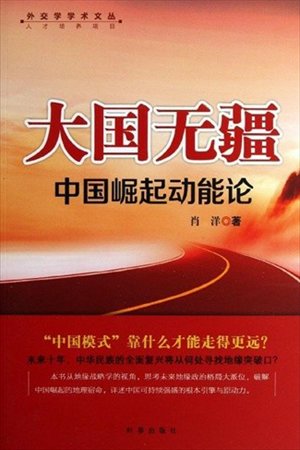HOME >> OP-ED
International outlook required to maintain momentum of China’s rise
Source:Global Times Published: 2013-12-12 19:33:01

Xiao Yang, Boundless Power - Analysis on the driving force of China's rise, Current Affairs Press, November 2013
"China might be the loneliest of all the rising powers in history," said Xiao Yang, a research fellow with the School of Law and Politics under the Beijing International Studies University.Through his studies on the international conditions of China's national rejuvenation, Xiao believes that currently, the difficulties that stand in the way of China's development are rising exponentially.
The global environment has changed in recent years in a direction that is unfavorable to China.
A nation's rise is filled with difficulties, which apply not only to China, but also all other powers that have risen. Therefore, smoothly passing through this key period is the current priority for China.
Xiao gives his own suggestions in this regard in a book named Boundless Power - Analysis on the driving force of China's rise, published by Current Affairs Press in November 2013, trying to answer the question of how China's rise can continue.
The book firstly analyzes the overall international configuration of China's rise, and then proceeds from China itself to explore the strategic culture and external security environment surrounding its rise. The last part of the book focuses on some hot issues in international politics, including carbon emissions, maritime terrorism and Arctic issues.
In regard to the international situation, Xiao lists three mainstream views that involve respectively a unipolar approach, another approach with one superpower and several major powers, and a multipolar structure.
However, he finds that problems exist in all three of these viewpoints because they are too rigid to realize the constant changes in international affairs.
On the national level, Xiao believes that to achieve a national rejuvenation, China should have its own strategic culture and make this the basis for influencing the thoughts and culture of the society.
There's a gap between China and the West in understanding the term "strategic culture."
Western scholars believe that culture here refers to a kind of value, while the Chinese side holds that strategic culture is the common name of systematic strategic ideas and strategic theories.
In this case, China should have a more comprehensive horizon to stand on a higher altitude to understand and explore its own strategic culture, from both the Western and traditional Chinese perspective.
Xiao divides China's strategy into two levels: Internally, China's strategy should raise the national strength; externally, the important task faced by China is to properly deal with the changes in the international political pattern.
But it is worth noting that these two levels cannot be separated from the ecological environment in a "carbon era." Such "carbon restrictions" require China to adjust its strategic culture.
Against the background of the energy crisis, coupled with the worsening of the security environment, Xiao suggests that focusing on maritime areas can be the way out for the Chinese economy's sustainable development.
Despite the current trend of bad-mouthing China's future development, Xiao insists that China can maintain its rise and continue to move toward national rejuvenation as it did in previous years.
China possesses strength that it didn't have in the past. China has grasped the opportunities brought by the changes of international geopolitics in recent years, and now it is China's turn to create conditions for its period of strategic opportunities.
To achieve that, a proper strategy that is suitable for both the international environment and China's own interests is crucial. That will be the driving force of China's sustainable rise.
Posted in: Fresh off the Shelf, Viewpoint